- Home
- Gerald Durrell
The Bafut Beagles Page 2
The Bafut Beagles Read online
Page 2
We drove on for some hours, and by the time we were nearing our destination the valleys were washed with deep purple shadows and the sun was sinking leisurely into a thousand scarlet-and-green feathers of cloud behind the highest range of western hills.
We knew when we reached Bafut, for there the road ended. On our left lay an enormous dusty courtyard surrounded by a high red brick wall. Behind this was a great assembly of circular huts with high thatched roofs, clustered round a small, neat villa. But all these structures were dominated and dwarfed by an edifice that looked like an old-fashioned bee-hive, magnified a thousand times. It was a huge circular hut, with a massive domed roof of thatch, black and mysterious with age. On the opposite side of the road the ground rose steeply, and a wide flight of some seventy steps curved upwards to another large villa, shoe-box shaped, its upper and lower storeys completely surrounded by wide verandas, the pillars of which were hung with bougainvillaea and other creepers in great profusion. This, I realized, was to be my home for the next few months.
As I got stiffly out of the lorry, an arched doorway in the far wall of the large courtyard opened and a small procession made its way across to where I stood. It consisted of a group of men, most of them elderly, clad in flowing multi-coloured robes that swished as they moved; on their heads they wore little skull-caps which were thickly embroidered in a riot of coloured wools. In the midst of this group walked a tall, slim man with a lively and humorous face. He was dressed in a plain white robe, and his skull-cap was innocent of decoration, yet, in spite of this lack of colour, I at once singled him out as the only one of any importance in the little cavalcade, so regal was his manner. He was the Fon of Bafut, ruler of the great grassland kingdom we had been travelling through and its immense population of black subjects. He was enormously wealthy, and he ruled his kingdom, I knew, with an intelligent, if slightly despotic, cunning. He stopped in front of me, smiling gently, and extended a large and slender hand.
‘Welcome,’ he said.
It was not until later that I learnt he could speak pidgin English as well as any of his subjects, but for some reason he was shy of his accomplishment, so we talked through an interpreter who stood, bent deferentially, translating my speech of welcome through his cupped hands. The Fon listened politely while my speech was translated, and then he waved one huge hand at the villa on top of the slope above us.
‘Foine!’ he said, grinning.
We shook hands again, then he walked back across the courtyard with his councillors and disappeared through the arched doorway, leaving me to install myself in his ‘foine’ house.
Some two hours later, when I had bathed and eaten, a messenger arrived and informed me that the Fon would like to visit me for a chat if I had sufficiently ‘calmed’ myself after my journey. I sent back a reply to the effect that I was quite calmed and that I would be delighted to receive a visit from the Fon; then I got out the whisky and awaited his coming. Presently he arrived, accompanied by his small retinue, and we sat on the veranda in the lamplight and talked. I drank his health in whisky and water, and he drank mine in neat whisky. We talked, at first, through an interpreter, but as the level of the whisky fell the Fon started to speak pidgin English. For two hours I was fully occupied in explaining my mission in his country: I brought out books and photographs of the animals I wanted, I drew them on bits of paper and made noises like them when all else failed, and all the time the Fon’s glass was being replenished with frightening regularity.
He said that he thought I should be able to get most of the animals I had shown him, and he promised that the next day he would send some good hunters to work for me. But, he went on, the best thing for him to do was to spread the word among his people so that they would all try to ‘catch beef’ for me; the best opportunity for this, he explained, was in about ten days’ time. Then there was to be a certain ceremony: apparently his subjects, on an appointed day, gathered large quantities of dry grass from the hills and valleys and brought it into Bafut so that the Fon could re-thatch the roof of the great juju house and the roofs of his innumerable wives’ houses. When the grass had been brought in he provided the food and drink for a feast. There would be many hundreds of people at this ceremony, assembled from all over the surrounding countryside, and the Fon explained that this would be an ideal opportunity for him to make a speech and explain to his people what I wanted. I agreed heartily, thanked him profusely, and refilled his empty glass. The level in the bottle fell lower and lower, until it was obviously innocent of even the most reluctant drops of liquid. The Fon rose majestically to his feet, stifled a hiccup, and then held out a hand.
‘I go!’ he proclaimed, waving in the vague direction of his small villa.
‘I’m sorry too much,’ I said politely; ‘you like I go walk for road with you?’
‘Yes, my friend,’ he beamed. ‘Na foine!’
I called for a member of the staff, who came running at the double carrying a hurricane lantern. He preceded us as we walked down the veranda towards the steps. The Fon was still clasping my hand in his, while with the other he gestured at the veranda, the rooms, and the moonlit garden some thirty feet below, muttering ‘Foine, foine,’ to himself in a self-satisfied way. When we reached the top of the long flight of steps he paused and stared at me pensively for a moment, then he pointed downwards with one long arm:
‘Sheventy-foif step,’ he beamed.
‘Very fine,’ I agreed, nodding.
‘We go count um,’ said the Fon, delighted at the idea. ‘Sheventy-foif, we go count um.’
He draped a long arm around my shoulders, leant heavily upon me, and we descended to the road below, counting loudly. As he could not remember the English for any number higher than six we got somewhat confused half-way down, and on reaching the bottom we found that according to the Fon’s reckoning there were three steps missing.
‘Sheventy-two?’ he asked himself; ‘no, na, sheventy-foif. Which side dey done go?’
He glared fiercely at his cringing retinue, who were waiting in the road, as though he suspected them of having secreted the missing steps under their robes. Hastily I suggested that we should count them again. We climbed up to the veranda once more, counting wildly, and then, to make quite sure, we counted them all the way down again. The Fon kept counting up to six and then starting again, and I could see that unless something was done we should spend all night searching for the missing steps; so, when we reached the top, and again when we got to the bottom, I said ‘Seventy-five!’ in loud, triumphant tones, and beamed at my companion. He was a bit reluctant to accept my reckoning at first, for he had only got up to five, and he felt that the missing seventy needed some explaining. However, I assured him that I had won innumerable prizes for mental arithmetic in my youth, and that my total was the correct one. He clasped me to his chest, clutched my hand and wrung it, muttering ‘Foine, foine, my friend,’ and then wended his way across the great courtyard to his own residence, leaving me to crawl up the seventy-five steps to bed.
The next day, in between coping with a headache brought on by my session with the Fon, I was kept busy building cages for the flood of specimens that I hoped would soon be rolling in. At noon four tall and impressive-looking young men turned up, clad in their best and brightest sarongs, and carrying flintlocks. These fearsome weapons were incredibly ancient, and their barrels were pitted and eroded with rust holes, as though each gun had suffered an acute attack of smallpox. I got them to stack these dangerous-looking weapons outside the gate before they came in and talked to me. They were the hunters the Fon had sent, and for half an hour I sat and showed them pictures of animals and explained how much I would pay for the various creatures. Then I told them to go away and spend the afternoon hunting, and to return in the evening with anything they caught. If they caught nothing they were to come again early the following morning. Then I distributed cigarettes, and they wandered off down the road, talking earnestly to each other, and pointing their guns in all directions wi
th great abandon.
That evening one of the four young men turned up again carrying a small basket. He squatted down and gazed at me sorrowfully while he explained that he and his companions had not had very good luck with their hunting. They had been a considerable distance, he said, but had found none of the animals I had shown them. However, they had got something.
Here he leant forward and put the basket at my feet.
‘I no savvay if Masa want dis kind of beef,’ he said.
I removed the lid of the basket and peered inside. I thought that it might contain a squirrel, or possibly a rat, but there sat a pair of large and beautiful toads.
‘Masa like dis kind of beef?’ asked the hunter, watching my face anxiously.
‘Yes I like um too much,’ I said, and he grinned.
I paid him the required sum of money, ‘dashed’ him some cigarettes, and he went off, promising to return the following morning with his companions. When he had gone I could turn my attention back to the toads. They were each about the circumference of a saucer, with enormous liquid eyes and short, fat legs that seemed to have some difficulty in supporting their heavy bodies. Their coloration was amazing: their backs were a rich cream, sprinkled with minute black vermiculations; the sides of the heads and bodies were a deep red, a colour that was a cross between mahogany and wine. On their bellies this was replaced by a vivid buttercup yellow.
Now I have always liked toads, for I have found them to be quiet, well-behaved creatures with a charm of their own; they have not the wildly excitable and rather oafish character of the frog, nor his gulping and moist appearance. But, until I met these two, I had always imagined that all toads were pretty much the same, and that having met one you had met them all as far as personality was concerned, though they might differ much in colour and appearance. But I very soon found out that these two amphibians had personalities so striking that they might almost have been mammals.
These creatures are called Brow-leaf Toads, because the curious cream-coloured marking on the back is, in shape and colour, exactly like a dead and withered leaf. If the toad crouches down on the floor of the forest it merges into its background perfectly. Hence its English title; its scientific title is ‘Eyebrow Toad’, which in Latin sounds even more apt: Bufo superciliarus, for the Brow-leaf, on first acquaintance, gives the impression of being overwhelmingly supercilious. Above its large eyes the skin is hitched up into two little points, so that the creature has its eyebrows raised at the world in a markedly sardonic manner. The immensely wide mouth adds to this impression of aristocratic conceit by drooping gently at the corners, thus giving the toad a faintly sneering expression that can only be achieved by one other animal that I know of, the camel. Add to this the slow, swaggering walk, and the fact that the creature squats down every two or three steps and gazes at you with a sort of pitying disdain, and you begin to feel that superciliousness could not go much farther.
My two Brow-leafs squatted side by side on a bed of fresh grass in the bottom of the basket and gazed up at me with expressions of withering scorn. I tipped the basket on its side, and they waddled out on to the floor with all the indignation and dignity of a couple of Lord Mayors who had been accidentally locked in a public lavatory. They walked about three feet across the floor and then, apparently exhausted by this effort, squatted down, gulping gently. They surveyed me very fixedly for some ten minutes with what appeared to be ever-increasing disgust. Then one of them wandered away and eventually crouched down by the leg of the table, evidently under the mistaken impression that it was the trunk of a tree. The other continued to stare at me, and after mature reflection he summed up his opinion of my worth by being sick, bringing up the semi-digested corpses of a grasshopper and two moths. Then he gave me a pained and reproachful look and joined his friend under the table.
As I had no suitable cage ready for them, the Brow-leafs spent the first few days locked in my bedroom, wandering slowly and meditatively about the floor, or squatting in a trance-like state under my bed, and affording me untold amusement by their actions. I discovered, after a few hours’ acquaintance with my plump room-mates, that I had sadly misjudged them, for they were not the arrogant, conceited creatures they pretended to be. They were actually shy and easily embarrassed beasts, completely lacking in self-confidence; I suspect that they suffered from deep and ineradicable inferiority complexes and that their insufferable air of superiority was merely a pose to hide from the world the hideous truth, that they had no faith in their fat selves. I discovered this quite by accident the night of their arrival. I was making notes on their coloration, while the toads squatted on the floor at my feet, looking as though they were composing their own entries for Burke’s Peerage. Wanting to examine their hindquarters more closely, I bent down and picked up one of them between finger and thumb, holding him under the arm-pits, so that he dangled in the air in a most undignified manner. He uttered a loud indignant belch at this treatment and kicked out with his fat hind legs, but my grip was too strong for him and he just had to dangle there until I had finished my examination of his lower regions. Eventually, when I replaced him on the ground next to his companion, he was a different toad altogether. Gone was his aristocratic expression: he was a deflated and humble amphibian. He crouched down, blinking his great eyes nervously, while a sad and timid expression spread over his face. He looked almost as if he was going to cry. This transformation was so sudden and complete that it was astonishing, and I felt absurdly guilty at having been the cause of his ignominy. In order to even things up a bit, I picked up the other one and let him dangle for a while, and he, too, lost his self-confidence and became timid and embarrassed when I replaced him on the floor. They sat there looking so dejected and miserable that it was ludicrous, and my unmannerly laughter proved too much for their sensitive natures, for they waddled rapidly away and hid under the table for the next half-hour. But now that I had learnt their secret I could deflate them at will when they became too haughty: all I had to do was to rap them gently on the nose with my finger, and they would crouch down guiltily, looking as though they were about to blush, and gaze at me with pleading eyes.
I built a nice large cage for my Brow-leafs, and they settled down in it quite happily; however, to keep them healthy, I allowed them to have a walk in the garden every day. When the collection increased, I found that there was too much work to be done for me to be able to stand around patiently while my two blue-blooded aristocrats took the air; I had to cut down on their walks, much to their annoyance. Then, one day, I found a guardian for them in whose hands I could safely leave them while I got on with my work. This guardian was none other than Pavlova the Patas monkey.
Pavlova was extremely tame and gentle, and she took an intense interest in everything that went on around her. The first time I put the Brow-leafs out for a walk near her she was quite captivated by them and stood up on her hind legs, craning her neck to get a better view as they walked sedately across the compound. Going back ten minutes later to see how the toads were getting on, I found that they had both wandered close to the spot where Pavlova was tied. She was squatting between them, stroking them gently with her hands, and uttering loud purring cries of astonishment and pleasure. The toads had the most ridiculously, self-satisfied expressions on their faces, and they were sitting there unmoving, apparently flattered and soothed by her caresses.
Every day after that I would put the toads out near to the place where Pavlova was tied, and she would watch them wandering about. She would give occasional cries of amazement at the sight of them, or else stroke them gently until they lay there in a semi-hypnotized condition. If ever they wandered too far away and were in danger of disappearing into the thick undergrowth at the edge of the compound, Pavlova would get very excited and call me with shrill screams to let me know that her charges were escaping, and I would hurry down and bring them back to her. One day she called me when the toads had wandered too far afield, but I did not hear her, and when I went down some time lat
er Pavlova was dancing hysterically at the end of her string, screaming furiously, and the Brow-leafs were nowhere to be seen. I undid the monkey’s leash, and she at once led me towards the thick bushes at the edge of the compound, and within a very short time she had found the runaways and had fallen on them with loud purring cries of joy.
Pavlova really got terribly fond of these fat toads, and it was quite touching to see how eagerly she greeted them in the morning, gently stroking and patting them, and how worried she got when they wandered too far away. A thing that she found very difficult to understand was why the toads were not clad in fur, as another monkey would be. She would touch their smooth skins with her fingers, endeavouring to part the nonexistent fur, a worried expression on her little black face; occasionally she would bend down and lick their backs in a thoughtful sort of way. Eventually she ceased to worry over their baldness, and treated them with the same gentleness and affection she would have displayed towards offspring of her own. The toads, in their own curious way, seemed to become quite fond of her as well, though she sometimes upset their dignity, which annoyed them. I remember one morning I had just given them both a bath, which they thoroughly enjoyed, and on walking across the compound they got various bits of stick and dirt stuck to their wet tummies. This worried Pavlova, for she liked her protégés to be clean and neat. I found her sitting in the sunshine, her feet resting on the back of one Brow-leaf as though he were a footstool, while the other one dangled in the most undignified fashion from her hand. As he slowly revolved in mid-air, Pavlova solemnly picked all the bits of rubbish from his tummy, talking to him all the time in a series of squeaks and trills. When she had finished with him she put him on the ground, where he sat looking very crestfallen, while his partner was hoisted up into the air and forced to undergo the same indignity. The poor Brow-leafs had no chance of being superior and pompous when Pavlova was around.

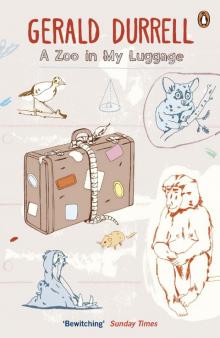 A Zoo in My Luggage
A Zoo in My Luggage The New Noah
The New Noah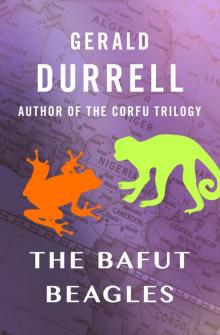 The Bafut Beagles
The Bafut Beagles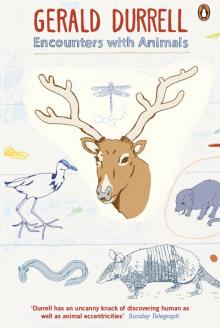 Encounters With Animals
Encounters With Animals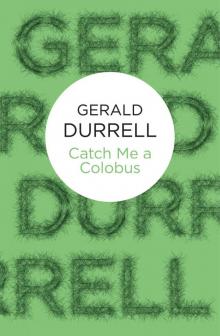 Catch Me a Colobus
Catch Me a Colobus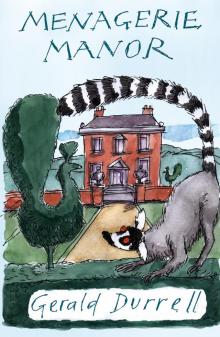 Menagerie Manor
Menagerie Manor The Picnic and Suchlike Pandemonium
The Picnic and Suchlike Pandemonium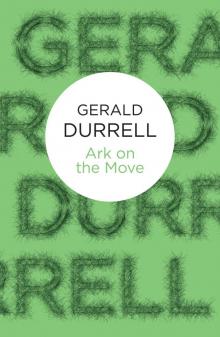 Ark on the Move
Ark on the Move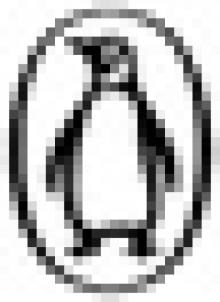 My Family and Other Animals
My Family and Other Animals Two in the Bush (Bello)
Two in the Bush (Bello) The Stationary Ark
The Stationary Ark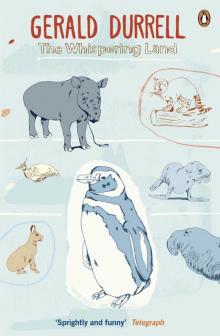 The Whispering Land
The Whispering Land Three Singles to Adventure
Three Singles to Adventure Fillets of Plaice
Fillets of Plaice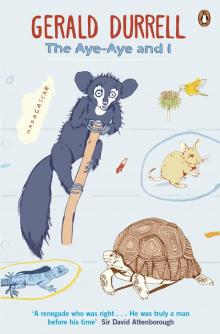 The Aye-Aye and I
The Aye-Aye and I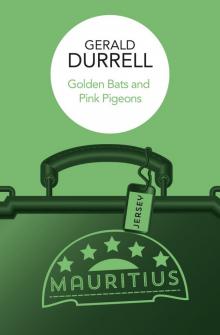 Golden Bats & Pink Pigeons
Golden Bats & Pink Pigeons The Drunken Forest
The Drunken Forest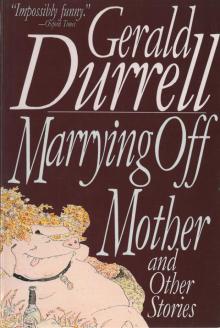 Marrying Off Mother: And Other Stories
Marrying Off Mother: And Other Stories The Corfu Trilogy (the corfu trilogy)
The Corfu Trilogy (the corfu trilogy)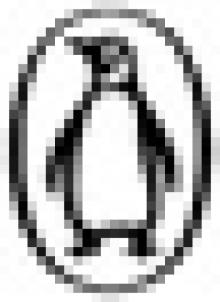 The Corfu Trilogy
The Corfu Trilogy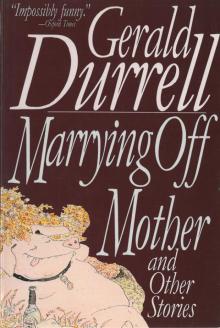 Marrying Off Mother
Marrying Off Mother Two in the Bush
Two in the Bush